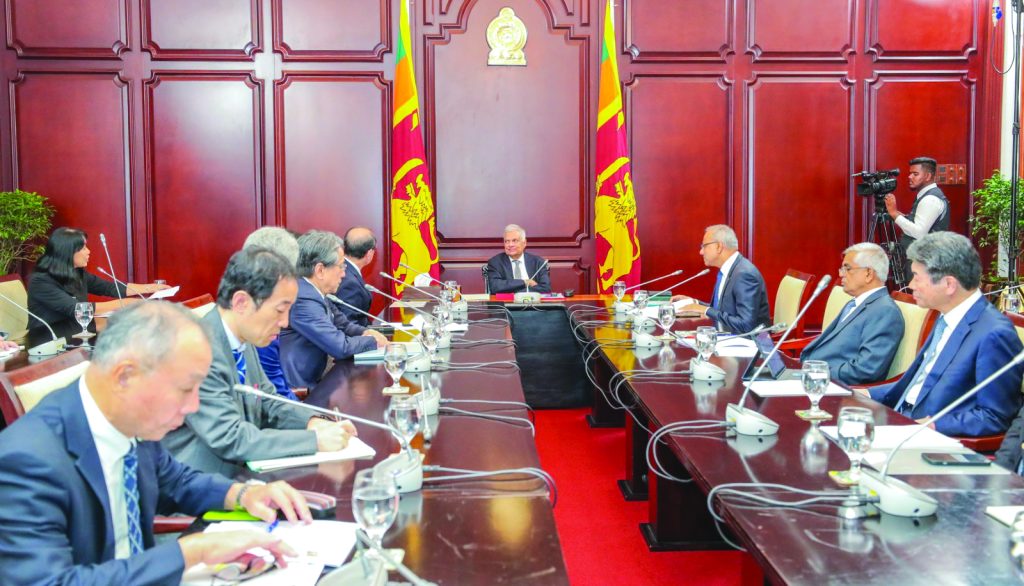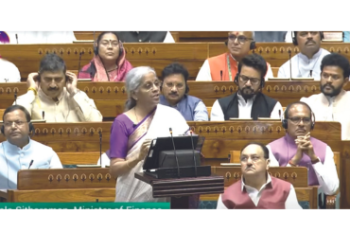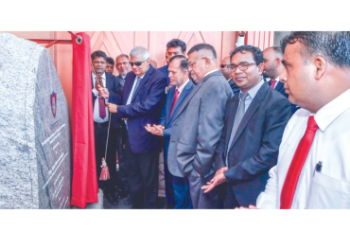July 18, 2024

President Ranil Wickremesinghe in discussion Dr. IZUMI Hiroto, the head of the Japanese delegation and other delegates.
Dr. IZUMI Hiroto, the head of the Japanese delegation visiting Sri Lanka, lauded the successful completion of the country’s debt restructuring process, noting that it has paved the way for the resumption of Japanese Official Development Assistance (ODA) projects. These projects, which include several initiatives that were suspended last period, are now poised to restart, signaling a renewed phase of cooperation and development.
Dr. Hiroto highlighted that the international community’s confidence in President Ranil Wickremesinghe’s leadership is strongly reflected in the expedited success of the debt restructuring agreements. This achievement, accomplished in partnership with the Official Creditors’ Committee and the International Monetary Fund, underscores a remarkable turnaround for Sri Lanka.
The high-level Japanese delegation, comprising representatives from the housing, construction, and urban sectors, met with President Ranil Wickremesinghe.
During the meeting, Dr. IZUMI Hiroto highlighted the successful completion of Sri Lanka’s debt restructuring process and announced that projects under Japanese Official Development Assistance (ODA), including those previously suspended, are set to resume.
Dr. Hiroto highlighted that the international community’s confidence in President Ranil Wickremesinghe’s leadership is strongly reflected in the expedited success of the debt restructuring agreements.
The discussion also focused on new investment opportunities in Sri Lanka, emphasizing the potential for enhanced cooperation between the two nations. The delegation expressed their appreciation for Sri Lanka’s economic progress and the swift achievement of debt restructuring agreements in collaboration with the Official Creditors’ Committee and the International Monetary Fund. They praised President Wickremesinghe’s leadership in navigating the country through its financial challenges, which has restored international confidence and paved the way for renewed development initiatives.
President Ranil Wickremesinghe, recalling Japan’s invaluable support during Sri Lanka’s debt restructuring process, emphasized Sri Lanka’s commitment to deepening economic cooperation with Japan across various sectors, including education and agricultural modernization. The President stressed the importance of resuming stalled projects under Japanese cooperation to strengthen bilateral relations further.
Additionally, President Ranil Wickremesinghe highlighted the critical role of the Colombo Dockyard, underscoring its significance as a key institution in Sri Lanka’s maritime and industrial landscape.
The Japanese delegation noted that several projects that are currently suspended, including the Bandaranaike International Airport (BIA) Development Project, the Colombo Port Eastern Terminal Development Project, the Central Expressway Construction and the Digital Broadcasting Project, can be promptly restarted.
Additionally, the delegation highlighted the potential to resume the Light Railway Transit (LRT), which was halted by the previous government. They are actively assessing locations to re-implement this project, recognizing its significant potential to alleviate traffic congestion in Colombo city.
Both sides emphasized the significance of Public-Private Partnerships (PPP) in executing housing for low-income earners and other urban development projects. They also highlighted that the Government of Sri Lanka is committed to promoting environmentally friendly projects and renewable energy in accordance with its policies and international agreements.
The Japanese delegation expressed their willingness to the President to recruit Sri Lankan graduates in the field of technology for job opportunities in Japan’s private sector. This initiative aims to improve the electricity supply sector in Japan. The delegation also highlighted the Joint Credit Mechanism (JCM), which encompasses projects designed to promote environmental sustainability by utilizing advanced Japanese technology to reduce carbon dioxide emissions.





